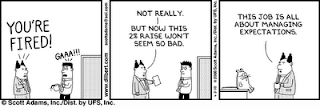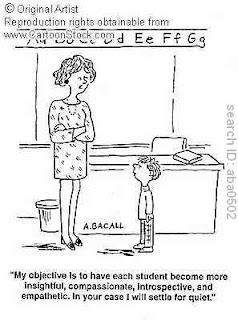 For the past two weeks I was on travel and then celebrating Diwali, that I missed out on blogging. Having made decent progress on blogging this year, I feel an inherent pressure to continue blogging every week. BTW the visitor counter on my blog page rolled over 1000, a small milestone met. I imagine readers expecting more blogs. So what does expectation do to a person? How can expectation be used as a positive force? In this blog, I explore the effects of expectation. Yet again, I take a chapter from the book "Predictably Irrational" to emphasise this theme.
For the past two weeks I was on travel and then celebrating Diwali, that I missed out on blogging. Having made decent progress on blogging this year, I feel an inherent pressure to continue blogging every week. BTW the visitor counter on my blog page rolled over 1000, a small milestone met. I imagine readers expecting more blogs. So what does expectation do to a person? How can expectation be used as a positive force? In this blog, I explore the effects of expectation. Yet again, I take a chapter from the book "Predictably Irrational" to emphasise this theme.Expectation is a mighty power indeed—so much so that a doctor can take an inert pill and tell a patient that it is a powerful drug, and the patient will react as though the actual drug has been taken. This well-documented phenomenon is called the placebo effect. It might also be called the "expectation effect". Back in Hyderabad, we have a family doctor who has pills filled in different plastic bottles. All these bottles looked alike. Even the pills were white in color. Some of the bottles contained pills of different sizes. For any illness we report, we get some white pills from one of these bottles. Within a few days, we were cured. Sometimes, what I wonder is whether these pills actually cure our illness, or is it our expectation that the doctor is good and he can cure any illness. The more I think of it, the more I am convinced that the placebo effect was playing a big role in our getting cured.

Whenever we start something believing that it would be good ,it generally is. When we think it will be bad, it will be bad. Dan Ariely in the book "Predictably Irrational" shares the experiment he and his colleagues carried out. They did a beer experiment. They told a set of MIT students the presence of vinegar in the beer before they tasted the brew. To the other set they told about the presence of vinegar after the brew was tasted. As it turned out, the students who found about the vinegar after drinking the beer liked the beer much better than those who were told about the vinegar up front.Telling the participants about the vinegar at the outset actually reshaped their sensory perceptions to align with this knowledge and accordingly influenced their expectations.
A profound and irrefutable law of life is that what is expected, tends to be realized. It happens all the time. The most famous experiment about this in education happened in the '60's in San Francisco and you can read about it in "Pygmalion in the Classroom." In that study, a normal distribution of students increased their IQ's by 15 to 30 points in one year simply because the teachers believed they were the best teachers and that they were given the best students (neither of which was true).Expectations drive so much of what happens around us.

Expectation can influence nearly every aspect of our life. The other evening at a team dinner,given by my boss,I was intrigued by the exotic description - mint with lemon and sprite, of a mocktail. I ordered it in anticipation of its taste and when it arrived, I thoroughly enjoyed it. My colleague who just repeated my order without reading, did not enjoy it. Now you know why most of the upscale resturants have fancy names on their menus and give detailed exotic descriptions. They can effectively influence the taste of the customers with this pre-knowledge.
Dan explains experiments done by neuroscientists to compare consumer's preference to Coke or Pepsi. They used functional magnetic resonance imaging machine. It turned out that the brain activation of the participants was different depending on whether the name of the drink was revealed or not.The dorsolateral aspect of the prefrontal cortex of the brain, an area involved in higher human brain functions like higher-order cognitions and ideas, was also activated. This should be good news to any advertisement agency because it means that the bright red can, swirling script and myriad ad messages, that have come down over the years, are as much responsible for our love of Coke as the brown bubbly stuff itself.
Expectations also shape stereotypes. This is why we have the expectation that an elderly person will need help using computers, or a student in IIT will be intelligent, or a succesful businessman has to be a Gujarati, or the kirana stores are run only my marwadis etc. One can see these stereotypes, even at work. Consider, a team that is aggressive, innovative and delivering consistent results. The expectation is that, any person joining the group will already have the DNA of this group.

Sam Walton said "High expectations are the key to everything". When you lead a team, set high expectations for the team. The team will find ways to meet them. My new boss says that he never apologises for setting a high bar for his team. I found this statement very profound. The more successful the team becomes, the more they believe in themselves.They then become better at triggering the anticipated positive result of whatever event they are trying to bring about.Along with the team, as you grow into a better person, better begets better and you do indeed become better and better.

Karen Stephens on parenting exchange says :Clear expectations help kids behave. Be specific about expectations. Focus on what children can do, rather than what they can't do. Give children reasons for expectations. Communicate expectations, offer choices, and then move on without haggling. High expectations move children forward, even if they don't always succeed.
So never underestimate the power of your expectations—on the people around you—or on yourself! Raise the bar.
Michael Jordan quotes "You have to expect things of yourselves before you can do them".
Happy Reading

1 comment:
Esos conceptos de auotomotivacion son efectivos me da gusto que sigas promocionando el que se enseñe la gente apensar,m a pre ver y a tener fe en lo que hace saludos desde mexico o de mi blogspot, estan muy buenos tus onceptos gracias un abrazo.
atte,Carlos Neri Torres.
http://noticiasdesdetijuana.blogspot.com/
Post a Comment